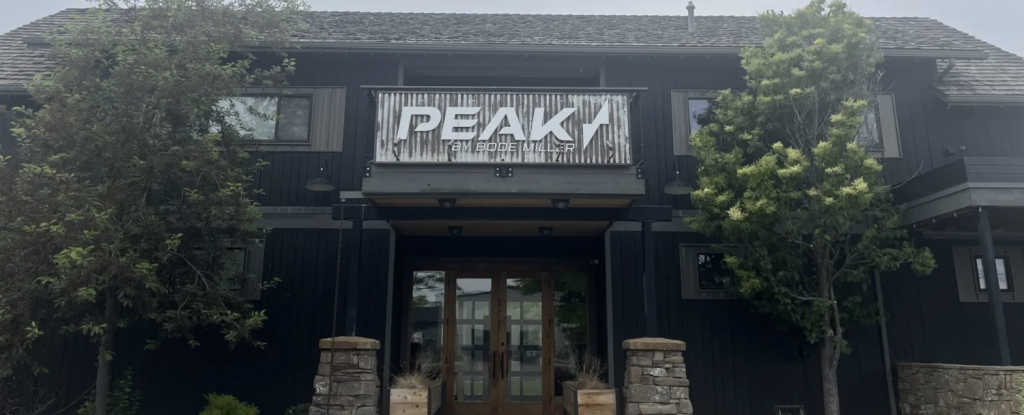Peak Ski Company Collapses in Debt Amid Allegations of Mismangement

David Ravo, Senior Editor, Misleading.com 7:15 PM 10/24/25
An Olympic icon turned entrepreneurial ghost—his name once symbolized grit and glory, now it’s bounced checks and vanished inventory. I’m watching a beloved skier leave investors, suppliers, and fans buried in the wreckage of a ski company that disappeared without a trace.
Peak Ski Company’s collapse wasn’t just a business failure—it was a betrayal of trust, ambition, and the spirit of the sport. I’m David Ravo, and this is my first-person editorial unpacking the disappointment and deception behind a brand that promised revolution and delivered wreckage.
I wanted to believe in Peak. I really did. When Bode Miller—Olympic legend, Montana local, and one of the most electrifying skiers of our time—announced he was launching a ski company built on innovation, grit, and direct-to-consumer transparency, it felt like a rare alignment of authenticity and ambition. This wasn’t some faceless brand cooked up in a boardroom. This was Bode. This was Bozeman. This was supposed to be different.Instead, it became a masterclass in how not to build trust.
Peak Ski Company didn’t just collapse—it evaporated. One minute it was touting its patented “keyhole” ski design and futuristic manufacturing; the next, its website was offline, its headquarters shuttered, and its skis stranded in a Slovenian factory with no one left to pay the bill. Contractors were ghosted. Athletes were stiffed. Investors were left holding the bag. And Bode? He disappeared into a haze of vague apologies and deflected blame.
Let’s start with the facts. Peak launched in 2021 with Bode Miller and resort executive Andy Wirth at the helm. The pitch was bold: reinvent ski design, cut out the middleman, and build a brand rooted in performance and transparency. They raised over $1.2 million in a 2024 crowdfunding campaign from nearly 600 investors. They signed top-tier athletes like Chris Davenport and Michelle Parker. They promised a revolution.
What they delivered was debt, silence, and broken contracts.
According to reports, Peak defaulted on numerous financial obligations, including vendor fees and promotional partnerships. More than 2,000 skis remain unpaid for at a factory in Slovenia. Athletes like Parker say they were paid only a fraction of their contracts. Employees were laid off. Lawsuits are looming. And the Bozeman HQ—once a symbol of local pride—is now a ghost town.
I’ve covered plenty of business collapses. But this one stings differently. Because Peak didn’t just sell skis—it sold identity. It wrapped itself in the credibility of Bode Miller, the romance of Montana, and the promise of ethical entrepreneurship. It told us it was here to fix what was broken in the ski industry. And then it broke everything.

Bode’s explanation? Operational costs were too high. Investor commitments didn’t materialize. The “monthly burn rate” was unsustainable. He says he’s trying to sell remaining skis to settle debts and keep the dream alive. But let’s be honest: the dream is dead. And the damage is done.
What makes this so misleading—so infuriating—is the way Peak leveraged trust. It didn’t just use Bode’s name; it used his legacy. It didn’t just market innovation; it marketed integrity. And when things went south, it didn’t offer transparency—it offered silence.
Jonathan Ellsworth of Blister Review put it bluntly: “You don’t sign some of the heroes of our sport and then steal from them, nor do you ghost the skiing public.” He’s right. Peak’s behavior isn’t just disappointing—it’s indefensible.

And yet, it’s part of a larger pattern. We’ve seen this before: charismatic founders, lofty promises, and a trail of unpaid bills. But when it happens in skiing—when it happens in Montana—it feels personal. Because this sport isn’t just about gear. It’s about community. It’s about trust. It’s about showing up.
Peak didn’t show up.
I’ve spoken to athletes who left longtime sponsors to join Peak. I’ve heard from contractors who were never paid. I’ve read the investor forums filled with confusion and anger. And through it all, the silence from leadership has been deafening.
This isn’t just a failed startup. It’s a cautionary tale. It’s a reminder that branding isn’t substance. That innovation isn’t ethics. That a famous name doesn’t guarantee accountability.
“And it’s a call to action.”
We need to rethink how we support brands in this space. We need to demand transparency—not just in product specs, but in financials, contracts, and leadership. We need to stop treating charisma as credibility. And we need to protect the people who make this industry run—from athletes to factory workers to local retailers.

Peak Ski Company had every opportunity to be a force for good. It had the talent, the vision, and the platform. But it chose shortcuts. It chose silence. It chose to mislead.
“And now, it’s gone.“
I’m not writing this out of bitterness. I’m writing it out of disappointment. Out of a deep respect for the sport and the people who believed in something better. Out of a desire to make sure this doesn’t happen again.
Because skiing deserves better. Montana deserves better. And the next time a brand tries to sell us a dream, we deserve to ask: who’s paying for it?
I’m David Ravo. And I’m not done watching. Not by a long shot. We want to hear from YOU!











